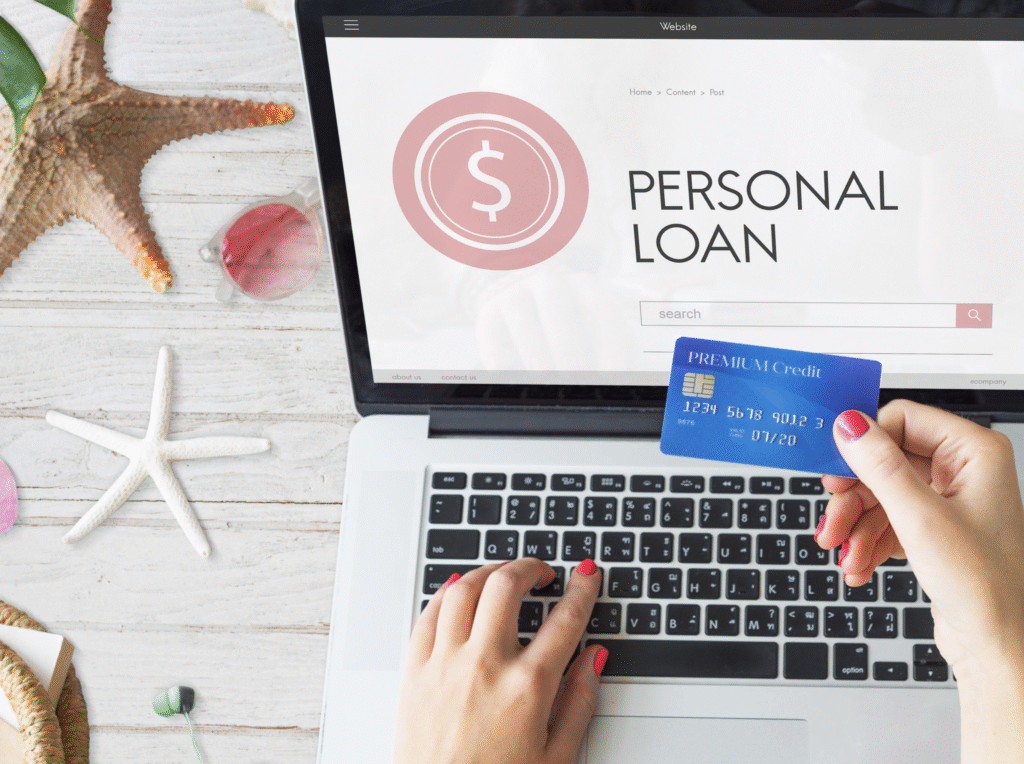In today’s fast-paced world, managing your finances effectively is more important than ever. Whether you need to cover an unexpected expense, consolidate debt, or finance a major purchase, personal loans have become an increasingly popular financial tool for individuals seeking flexible funding options.
But what exactly is a personal loan, how does it work, and what benefits can it offer you? In this comprehensive article, we’ll explore everything you need to know about personal loans, including how to apply, the advantages and risks involved, and answer common questions to help you make an informed decision.
Key Takeaways
- Personal loans are versatile and can be used for almost any purpose.
- They can offer lower interest rates than credit cards, especially if you have good credit.
- Fixed monthly payments help with budgeting and financial planning.
- They are ideal for debt consolidation and emergencies.
- Always compare loan offers and understand terms before borrowing.
- Timely repayment can improve your credit score.
- Be cautious of fees, penalties, and borrowing more than you can repay.
What Exactly Is a Personal Loan?
A personal loan is a type of installment loan that individuals can borrow from banks, credit unions, or online lenders. Unlike mortgages or auto loans, which are secured by the property or vehicle being purchased, personal loans can be secured or unsecured:
- Secured Personal Loans: Backed by collateral like a savings account, vehicle, or property. Because there’s less risk for the lender, these loans often come with lower interest rates.
- Unsecured Personal Loans: Do not require collateral. They typically have higher interest rates since the lender assumes more risk.
Personal loans generally have fixed repayment terms, usually ranging from 1 to 7 years, and fixed monthly payments that cover both principal and interest.
How Does a Personal Loan Work?
Here’s a typical process of how a personal loan works:
- Application: You submit an application to a lender, either in person, over the phone, or online. The application includes personal information, income details, employment status, and information about your credit history.
- Approval: The lender reviews your credit score, debt-to-income ratio, employment history, and other factors to determine your creditworthiness.
- Loan Offer: If approved, the lender presents loan terms such as the loan amount, interest rate, fees, and repayment period.
- Disbursement: Once you accept the terms, the funds are deposited into your bank account, often within a few days.
- Repayment: You repay the loan over the agreed term with fixed monthly payments.
Benefits of Personal Loans
Personal loans offer several advantages, making them a versatile option for many borrowers:
Flexibility in Use
Unlike home or auto loans, which are tied to specific purchases, personal loans can be used for almost anything. Whether you want to finance a wedding, renovate your home, pay for medical bills, or consolidate credit card debt, personal loans provide flexibility.
One of the biggest advantages of personal loans is their unparalleled flexibility. Unlike specialized loans such as mortgages or auto loans, which are tied to specific purchases, personal loans give you the freedom to use the funds for almost any purpose. This versatility makes them a powerful financial tool that can meet a wide range of needs—planned or unexpected.
Use for Debt Consolidation
Many borrowers turn to personal loans to consolidate existing debt. High-interest credit card debt can quickly become overwhelming with variable interest rates and minimum payments that stretch your finances. By taking out a personal loan to pay off credit cards and other debts, you simplify your payments to just one fixed monthly amount, often at a lower interest rate. This flexibility not only makes budgeting easier but also helps you pay down your debt faster and save money on interest.
Finance Large Purchases
Personal loans can help you afford big-ticket items without depleting your savings. Whether you want to buy new furniture, electronics, or household appliances, a personal loan offers a way to spread the cost over time. Because you repay the loan in installments, you avoid the financial strain of paying the entire amount upfront.
Cover Emergency Expenses
Life is unpredictable. Unexpected emergencies like medical bills, car repairs, or urgent home maintenance can strain your finances. A personal loan provides quick access to funds when you need them most. Unlike credit cards, which can carry high-interest rates and fluctuating minimum payments, personal loans offer a predictable repayment schedule, helping you manage emergencies without jeopardizing your financial stability.
Home Improvement and Renovation

Whether you want to upgrade your kitchen, add a new bathroom, or make your home more energy-efficient, a personal loan can be a practical choice to finance home improvements. Unlike home equity loans or lines of credit that require collateral and have longer approval times, personal loans are easier to obtain and provide funds faster, making it easier to start your project right away.
Pay for Education and Training
Investing in yourself through education or professional development can lead to better career opportunities and higher income. Personal loans can cover tuition, certification courses, or training programs, especially when federal student loans or scholarships don’t cover all costs. The flexibility to use funds for education without restrictions allows you to choose programs that best fit your goals.
Fund Life Events
Major life events such as weddings, anniversaries, or milestone celebrations often come with significant expenses. Personal loans give you the financial freedom to plan the event you want without waiting to save up the entire amount. The predictable repayment terms also help you manage your cash flow during and after the event.
Travel and Vacations
Travel is often one of the first things people cut from their budgets when money is tight. A personal loan allows you to fund a dream vacation or important trip without resorting to credit cards. With a clear repayment plan, you can enjoy your trip knowing you have a structured way to pay back the cost over time.
Business and Side Hustles
If you’re starting a small business or side hustle, personal loans offer a simple way to fund startup costs, inventory, marketing, or equipment. Unlike business loans, which may have stricter requirements, personal loans provide easier access to capital that you can use flexibly to grow your enterprise.
Why Flexibility Matters
This broad flexibility makes personal loans unique and attractive compared to other financial products. Borrowers aren’t restricted by specific use cases or complicated approval processes tied to particular purposes. Instead, you get to decide how best to allocate the funds based on your unique financial situation and goals.
This freedom empowers you to:
- Address urgent needs without hassle
- Plan and invest in your future
- Manage cash flow effectively
- Avoid costly, high-interest credit options
Final Thought
When considering a personal loan, the freedom to use the funds for whatever purpose fits your needs is a major benefit that can help improve your financial well-being. However, with great flexibility comes responsibility. Be sure to borrow only what you need and have a clear repayment plan to avoid unnecessary debt. When used wisely, personal loans can be a versatile financial solution tailored to your life’s many demands.
Lower Interest Rates Compared to Credit Cards
If you have good credit, personal loans often come with lower interest rates than credit cards, making them a cost-effective way to borrow money.
When it comes to borrowing money, the cost of credit—primarily the interest rate—can significantly impact your financial health. High interest rates can cause your debt to balloon quickly, making it difficult to repay. One of the key advantages of personal loans over credit cards is that personal loans typically offer much lower interest rates, which can save you a substantial amount of money in the long run.
Understanding Interest Rates: Personal Loans vs. Credit Cards

Credit cards are a convenient form of borrowing, often used for everyday purchases and emergencies. However, they come with high-interest rates—often ranging from 15% to 25% or more annually. These rates apply to any balance you carry beyond your grace period, meaning if you don’t pay your full balance each month, interest can accumulate rapidly.
In contrast, personal loans generally come with fixed interest rates that are considerably lower than credit card rates, especially if you have good credit. Depending on your creditworthiness, personal loan interest rates typically range from 6% to 15%. This difference may seem small at first glance, but over the life of a loan, even a few percentage points less can lead to huge savings.
Why Are Personal Loan Interest Rates Lower?
There are several reasons why personal loans tend to have lower interest rates than credit cards:
- Loan Structure and Risk:
Personal loans are installment loans with fixed repayment schedules. Because the lender has a set timeline for repayment and a clear understanding of the borrower’s ability to pay, the risk of default is lower. Credit cards, on the other hand, are revolving credit with no fixed payoff date, which makes them riskier for lenders. - Credit Profile and Loan Terms:
Personal loans often require a stronger credit profile than credit cards to qualify for the best rates. Borrowers with higher credit scores are rewarded with lower interest rates. Credit cards are more widely available to consumers with various credit backgrounds, so their rates must cover higher risks. - Secured vs. Unsecured Options:
Some personal loans can be secured with collateral (like a savings account or vehicle), which lowers the lender’s risk and reduces interest rates. Credit cards are unsecured, making them inherently riskier and therefore more expensive for consumers.
How Lower Interest Rates Benefit You
Lower interest rates on personal loans translate to several financial advantages:
- Lower Monthly Payments:
Because interest makes up part of your monthly loan payment, a lower interest rate means your monthly payments will be more affordable. - Less Total Interest Paid Over Time:
Over the life of the loan, lower interest means you pay less overall, freeing up money for savings or other financial goals. - Faster Debt Repayment:
With less money going toward interest, more of your payment applies to the principal balance, helping you pay off your loan sooner.
Using Personal Loans to Manage Credit Card Debt
A common and smart strategy is using a personal loan to consolidate high-interest credit card debt. For example, if you carry multiple credit card balances with interest rates between 18% and 25%, refinancing those debts into a single personal loan with a 10% interest rate can dramatically reduce how much you pay in interest each month. This makes your debt more manageable and helps improve your credit score as you steadily pay down the loan.
Things to Keep in Mind
While personal loans generally offer lower rates than credit cards, it’s important to shop around. Interest rates can vary based on your credit score, loan amount, and lender policies. Additionally, watch out for fees such as origination fees or prepayment penalties that could affect the total cost of borrowing.
Fixed Monthly Payments
With personal loans, you have predictable monthly payments, helping with budgeting and financial planning. This is unlike credit cards where payments and interest can fluctuate.
Debt Consolidation
One popular use of personal loans is consolidating high-interest debts into a single loan with a lower interest rate. This can simplify your payments and potentially save money on interest.
Build or Improve Credit Score
Making consistent, on-time payments on a personal loan can help improve your credit score over time, opening doors for better financial products in the future.
Who Should Consider a Personal Loan?
While personal loans can benefit many people, they are especially suited for:
- Individuals with Good to Excellent Credit: Those likely to qualify for better interest rates and terms.
- People Looking to Consolidate Debt: Those with multiple credit card balances or other debts can simplify their payments.
- Borrowers Needing Funds for Emergencies: Unexpected medical bills, car repairs, or home maintenance.
- Individuals Financing Life Events: Weddings, vacations, or education expenses.
Risks and Considerations
While personal loans offer many benefits, there are risks and things to keep in mind:
- Fees and Penalties: Some loans have origination fees, prepayment penalties, or late fees.
- Impact on Credit Score: Applying for multiple loans in a short time can lower your credit score.
- Possibility of Over-Borrowing: Easy access to funds can lead to borrowing more than you can comfortably repay.
- Variable Interest Rates: Some personal loans may have variable rates, which can increase over time.
Also Read : How Does Nelnet Manage Student Loans?
Conclusion
Personal loans are powerful financial tools that can provide you with quick access to funds for various needs — from consolidating debt to covering emergency expenses or making a big purchase. Understanding how they work and weighing the pros and cons will help you make smart borrowing decisions.
By choosing the right lender and loan product, you can take advantage of lower interest rates, flexible repayment terms, and predictable monthly payments, all while improving your credit profile.
FAQs
1. What credit score do I need for a personal loan?
Most lenders require a credit score of 600 or higher for unsecured personal loans, but better rates usually require scores above 700.
2. How much can I borrow with a personal loan?
Loan amounts typically range from $1,000 to $50,000, depending on your creditworthiness and lender policies.
3. Can I get a personal loan with bad credit?
Yes, but expect higher interest rates and possibly the need for collateral or a co-signer.
4. How long does it take to get approved for a personal loan?
Approval times vary from minutes (online lenders) to a few days (traditional banks).
5. What is the average interest rate on a personal loan?
Rates vary widely, usually between 6% and 36%, depending on credit and loan type.
6. Can I pay off my personal loan early?
Most lenders allow early repayment without penalties, but always check your loan terms.
7. Are personal loans taxable?
No, the loan amount is not considered income and is not taxable.


